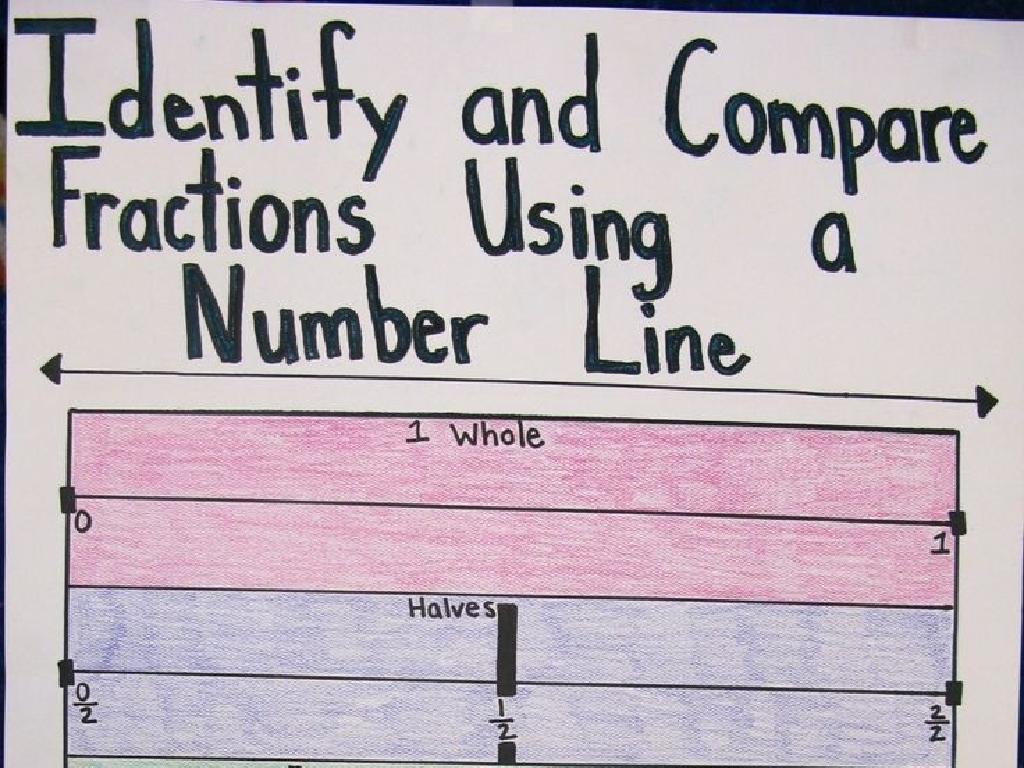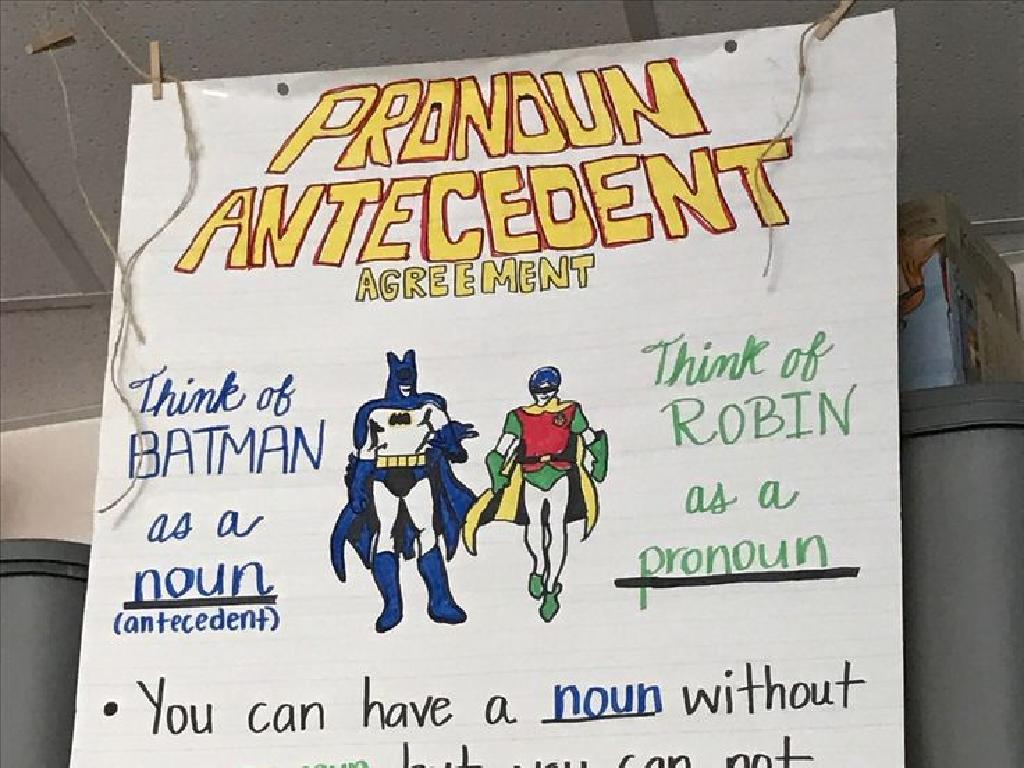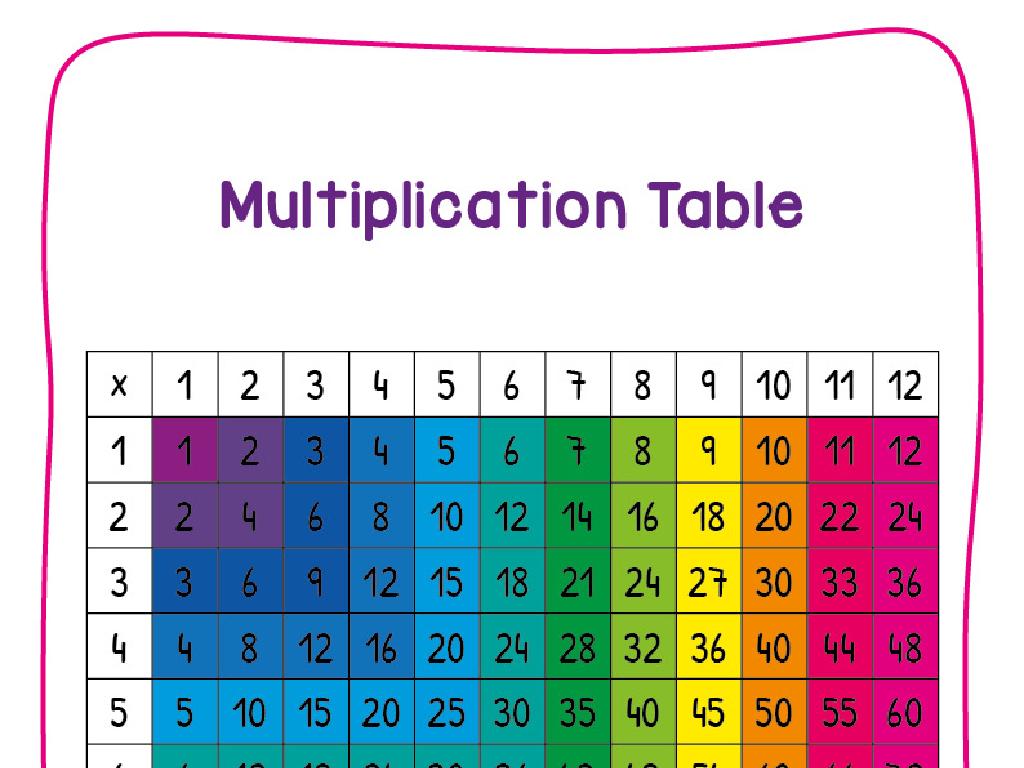Words With -Less
Subject: Language arts
Grade: Seventh grade
Topic: Prefixes And Suffixes
Please LOG IN to download the presentation. Access is available to registered users only.
View More Content
Diving into Prefixes and Suffixes
– Building blocks of words
– Defining prefixes and suffixes
– Prefixes come before the root of the word, suffixes come after
– Examples of common prefixes
– ‘un-‘, ‘re-‘, ‘pre-‘ indicate not, again, before
– Examples of common suffixes
– ‘-ful’, ‘-ness’, ‘-less’ indicate full of, state of, without
|
This slide introduces the concept of prefixes and suffixes, which are essential components of many English words. Understanding them helps students decode word meanings and build their vocabulary. Prefixes are added to the beginning of a word to alter its meaning, while suffixes are added to the end. Provide examples of common prefixes and suffixes, emphasizing how they change the meaning of the root word. For instance, the suffix ‘-less’ means without, so ‘fearless’ means without fear. Encourage students to think of additional examples and how the addition of a prefix or suffix can change the meaning of a word.
Understanding the Suffix ‘-less’
– ‘-less’ means ‘without’
– ‘fearless’: without fear
– Example: A fearless person is not afraid
– ‘homeless’: without a home
– Example: A homeless person does not have a place to live
– ‘-less’ alters word meanings
|
The suffix ‘-less’ is added to the end of a noun or an adjective to indicate the absence of something. For example, ‘fearless’ describes someone who is not influenced by fear, and ‘homeless’ refers to an individual who lacks a permanent place of residence. It’s important to discuss with students how adding ‘-less’ to a word can change its meaning entirely, often transforming it into its opposite. Encourage students to think of other examples and consider the impact of the suffix on the original word. This understanding will enhance their vocabulary and comprehension skills.
Exploring ‘-less’ Words
– Identify ‘-less’ ending words
– Use ‘-less’ words in sentences
– Create sentences to grasp the meaning of words like ‘fearless’, ‘hopeless’, etc.
– Group activity: brainstorming
– Collaborate to find and discuss new ‘-less’ words
– Understanding ‘-less’ meaning
|
This slide is aimed at helping students understand the suffix ‘-less’ and how it alters the meaning of a word. Start by having students identify words that end with ‘-less’ and write them down. Then, ask them to construct sentences using these words to ensure they comprehend the meanings. For the group activity, students will work together to brainstorm additional ‘-less’ words, promoting peer learning and expanding their vocabulary. Encourage them to think about how ‘-less’ often implies a lack of something, such as ‘fearless’ meaning without fear. This exercise will enhance their understanding of word formation and the nuances of English language.
Crafting Sentences with ‘-less’
– Choose words ending in ‘-less’
– Create original sentences
– Use your ‘-less’ words in a creative or descriptive way.
– Share with the class
– Discuss ‘-less’ impact on words
– How does adding ‘-less’ change the meaning of the root word?
|
This slide is designed to engage students in an interactive class activity focused on understanding the suffix ‘-less’ and its effect on word meaning. Students will select words that end with ‘-less’, such as ‘fearless’ or ‘hopeless’, and use them to construct sentences that illustrate their understanding of the words’ meanings. Afterward, they will share their sentences with the class, fostering a collaborative learning environment. The class will then discuss how the suffix ‘-less’ alters the meaning of the root word, emphasizing its role in indicating the absence of something (e.g., ‘fearless’ means without fear). This activity will help students grasp the concept of suffixes and their importance in word formation. Encourage creativity and provide guidance to ensure students create meaningful sentences. Prepare to offer examples and lead a discussion that highlights the nuances of language.
The Power of Suffixes: Understanding ‘-less’
– Suffixes change word classes
– A suffix can alter a word’s grammatical role
– Activity: Adjectives to nouns with ‘-less’
– Turn ‘care’ into ‘careless’, what does it mean now?
– ‘-less’ affects meaning and usage
– Suffix ‘-less’ often indicates ‘without’ or ‘lacking’
– Examples: ‘fear’ to ‘fearless’
|
This slide introduces students to the concept of suffixes, focusing on ‘-less’ and its role in changing word classes, meanings, and usage. Begin by explaining that suffixes are added to the end of words to create new words with different meanings or grammatical functions. During the activity, guide students to convert adjectives into nouns by adding ‘-less’, and discuss how the meaning changes (e.g., ‘care’ to ‘careless’ implies lacking care). Provide examples and encourage students to explore the connotations of words with ‘-less’. This exercise will help them understand how suffixes can completely alter the meaning of a word and its use in sentences. For the activity, have students work in pairs or small groups to create a list of ‘-less’ words, discuss their meanings, and use them in sentences. Share and discuss as a class afterward.
Class Activity: Word Creation Challenge
– Form groups for a word challenge
– Create new words with ‘-less’
– Combine ‘-less’ with different roots to form new words
– Present your best word and meaning
– Share the word’s definition and use in a sentence
– Vote on the most innovative word
– Decide as a class which word is the most creative and practical
|
This activity is designed to engage students with the concept of suffixes, specifically ‘-less’, to enhance their vocabulary and understanding of word formation. Divide the class into small groups and provide them with a list of root words to which they can add ‘-less’. Encourage creativity and exploration of meaning. After the group work, each group will present their most creative word, explaining its meaning and how it could be used in a sentence. Conclude the activity with a class vote to select the most innovative and useful word. This will not only reinforce the lesson but also promote teamwork and public speaking skills. Possible words could include ‘fearless’, ‘endless’, ‘hopeless’, etc. Ensure that each group has a chance to present and that the voting process is fair and encouraging.
Review and Homework: Mastering ‘-less’
– Recap today’s ‘-less’ lesson
– Write a story with ‘-less’ words
– Incorporate words like ‘fearless’, ‘endless’, ‘restless’ in your narrative
– Homework: 5 ‘-less’ words story
– Study for prefixes & suffixes quiz
– Review all notes on prefixes and suffixes for the quiz
|
Today’s lesson focused on the suffix ‘-less’, which means ‘without’. For homework, students are to write a creative short story that includes at least five words ending in ‘-less’. This will help reinforce their understanding of the suffix and its meaning in context. Additionally, students should prepare for a quiz on prefixes and suffixes, reviewing the materials provided in class. Encourage them to think about how different prefixes and suffixes modify the meanings of root words. Provide examples of ‘-less’ words and their definitions to support their homework assignment.






